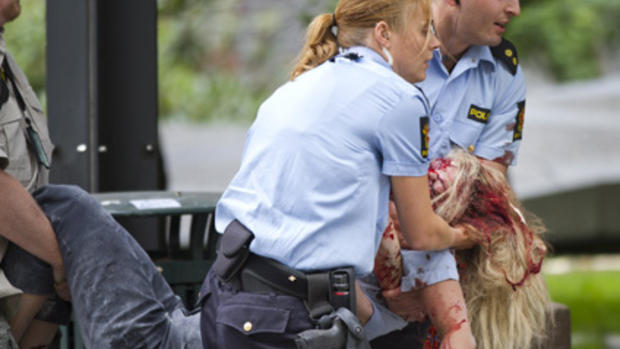After slow response, Norway defends police
Norway's justice minister defended the actions of police responding to Friday's terror attacks, in response to a question about the mounting admissions of missteps.
Police have acknowledged that they took 90 minutes to reach Utoya island, where a gunman was picking off young people attending a retreat for the Labor Party's youth wing. They weren't able to deploy a helicopter because the entire crew had been sent on vacation. Victims who called emergency services from the midst of the massacre reported being told to stay off the line because authorities were dealing with the Oslo bombing.
Authorities also dramatically lowered the death toll Monday, apparently because they counted 18 bodies twice in the confusion following the massacre. They initially said 86 people died on the island, but now say the figure is 68.
Norway rampage suspect: How many did I kill?
Breivik lawyer: Case suggests my client is insane
"That makes him a person that killed [nearly] one person every minute. If the police had actually been there just a half an hour earlier, then 30 young lives would have been saved," Anne Holt, Norway's former justice minister, told the BBC, referring to the original death toll.
Even the suspect, Anders Behring Breivik, was surprised he wasn't stopped sooner, his lawyer Geir Lippestad told reporters Tuesday.
Police plan to start publicly naming the dead for the first time Tuesday.
"I feel the police have delivered well in this situation. I also feel they've delivered especially well on the points where there's been criticism raised," said Storberget.
When asked if police would open an investigation into their conduct, Storberget indicated that such a probe was for the future.
"It's very important that we have an open and critical discussion about how all sections of society handle a situation. ... But there's a time for everything, and we have been fully focused and continue to be focused on taking care of all those that have been affected," said Storberget.
Storberget told reporters that his offices were also "hard hit" by the attacks.
"The Justice Ministry has people who are missing," he told reporters.
Breivik made his first appearance in court on Monday to answer the terrorism charges against him. He calmly told the court that he committed the massacre but pleaded not guilty because he acted to save Europe from "Muslim domination." His plea guarantees him future court hearings and opportunities to address the public, even indirectly — a chilling thought given that he has claimed the killings were meant to serve as "marketing" for his 1,500-page manifesto.
Prosecutor: Breivik expects to spend life in prison
Police believe Breivik, 32, acted alone, despite his grand claims in the manifesto that he belongs to a modern group of crusaders. But they have not completely ruled out that he had accomplices.
Judge Kim Heger ordered Breivik held for eight weeks, including four in isolation, noting his reference to "two more cells within our organization."
Authorities say Breivik used two weapons during the island attack — both bought legally, according to his manifesto. A doctor treating victims told The Associated Press the gunman used illegal "dum-dum"-style bullets designed to disintegrate inside the body and cause maximum internal damage.
Breivik faces 21 years in prison for the terrorism charges, but he has told authorities he never expects to be released. While 21 years is the stiffest sentence a Norwegian judge can hand down, a special sentence can be given to prisoners deemed a danger to society, who are locked up for 20-year sentences that can be renewed indefinitely.
In Breivik's court appearance, he alluded to two other "cells" of his network — which he refers to in his manifesto as a new "Knights Templar," the medieval cabal of crusaders who protected Christian pilgrims in the Holy Land.
Norway suspect to judge: 2 other cells out there
Norway suspect idols: Unabomber, Knights Templar
In the treatise, he describes being invited to join the group, which he says is dedicated to "anti-jihad," and claims members held meetings in London and the Baltics. Afterward, he says, they vowed not to contact one another and to instead plan their "resistance" on their own.
But they were also to space out their attacks, he wrote. "We should avoid any immediate follow-up attacks as it would negate the shock effect of the subsequent attacks. A large successful attack every 5-12 years was optimal," he wrote.
At one point, his manifesto briefly referred to an intention to contact two other cells, but no details were given.
European security officials said they were aware of increased Internet chatter from individuals claiming they belonged to the Knights Templar and were investigating claims that Breivik, and other far-right individuals, attended a London meeting of the group in 2002.
